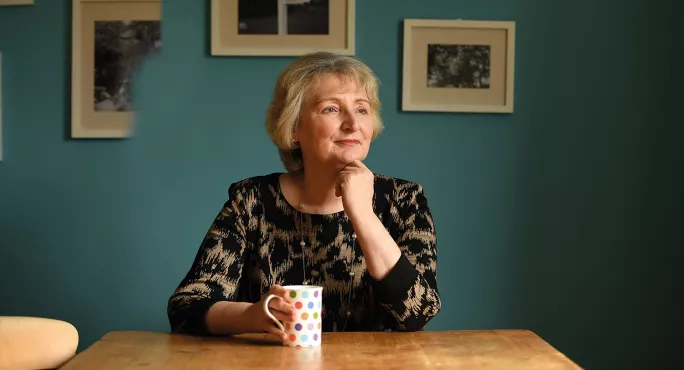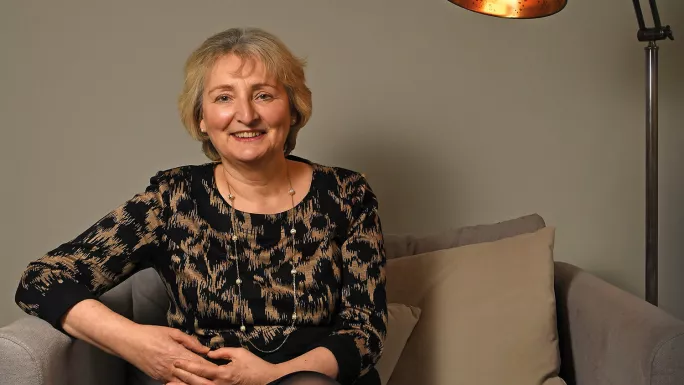
- Home
- TES talks to... Deborah Eyre
TES talks to... Deborah Eyre

How many pupils in your class would you define as “higher ability”? A single stand-out student? A handful of brilliant minds? Half the class - or even all of them?
Teachers’ answers will differ enormously. But according to the work of researcher Deborah Eyre, the answer from most teachers should be along the lines of: “All of them, potentially.”
Professor Eyre has developed a theory called “high-performance learning”. It states that many pupils are capable of achieving the high levels of academic success that are often seen as only attainable by the few, and that a school’s job is to make this vision a reality.
Since September, she’s been putting that theory into action in state schools for the first time.
Getting to this point has been an interesting journey for Eyre. She has specialised in working with high-attaining pupils since the early days of her career in the 1970s when, as a twentysomething primary school teacher in a leafy part of Maidenhead, Berkshire, she was asked to take responsibility for the most-able students throughout her school.
‘High-perfomance learning says you don’t lower the bar for 20 per of students because three of them can’t get there’
“It was an unheard of role,” she recalls.
During the 1980s and 1990s, Eyre led an Oxfordshire-wide programme to help schools to develop their most able pupils, and in the late 1990s she became an academic researcher investigating high performance in schools at Oxford Brookes University.
By the turn of the millennium, when the Blair government was turning its attention to this field, she was well placed to take a prominent role in its work: she became a leading figure in its “gifted and talented” programme, heading up the National Academy for Gifted and Talented Youth, a government programme set up in 2002 to identify the most-able pupils and give them extra support to excel at school.
Paradigm shift
Her latest thinking about high performance turns the orthodoxy of the Blair years on its head. Back then, says Eyre, the fashion was for a concept called the “cohort paradigm” - the idea that you could pick out a limited cohort of gifted pupils and support them to excel. She no longer believes in this. Instead, she thinks that those opportunities - and the high expectations that come with them - should apply to everybody.
“What was going right [during the Blair years] was, we learned a lot more about what advanced learning should look like and how to make it routinely available,” she explains.
“What was wrong was that the government was obsessive about identification… Therefore, even though your average teacher understood more about what advanced learning looked like, they weren’t always making it available beyond the cohort in question.”
This was bad for social mobility, believes Eyre. “We know from research across the world that cohort approaches, no matter how hard you try, are always inequitable,” she says. “You will be under-representing students from disadvantaged families.”
Her latest thinking is far more ambitious.
“In theory, what we know from psychology and neuroscience is that almost everybody could be getting their A* at GCSE,” she claims. “In practice, that’s unlikely because there are a load of barriers that individuals face in terms of making progress, but the job for schools is to remove as many of those barriers as possible, rather than thinking only a proportion of them are going to do well.”
This is a theory that she first mooted in 2011. “More pupils than we previously thought have the potential to perform at the highest levels,” she wrote in a report that year for thinktank Policy Exchange, called Room at the Top.

“The way to secure this is to create a system that expects significantly more from more pupils.”
Since then, she has been working towards practical applications for making this work. Her research is based on studying the traits of successful learners and instilling those traits in all pupils. Eyre has identified a set of “cognitive competencies” that all pupils should develop, including perseverance, resilience, and the ability to think logically and critically, to solve complex problems, to have an open mind and to work collaboratively.
Eyre has also developed a framework from which school leaders can work to create high-performance pedagogy. This consists of seven pillars: mindset shift; enquiry-based learning; expertise development; practice and training; feedback; engagement of parents; and acting ‘with’ students, not doing ‘to’ them.
She has come to the conclusion that there is no single fixed model for schools to implement this framework. “In your school, you’ll know best how to do it,” she says.
Eyre now runs a commercial business called High Performance Learning to help schools find that bespoke approach.
In one example of a school she has worked with, teachers wanted to instil perseverance into nursery pupils. To achieve this, they made medals labelled “perseverance”.
“If a child persevered for a sustained period, they got to wear the medal and the teacher would send a picture of it to their parents, saying, ‘great example of perseverance’,” she explains. “It means the parents also know that the school values perseverance, so if a child can’t get their coat on very fast in the mornings, rather than intervening immediately, the parent will let them grapple a bit.”
‘This is for everybody’
Since September, Eyre has been working with eight schools on implementation of the framework: two grammar schools, two comprehensives, a primary and three international all-through schools.
This marks a major shift from the schools she first worked with on practical applications of her research: her previous test bed was between 2010 and 2014 through her role as education director of Nord Anglia Education, which runs international private day and boarding schools.
Sceptical teachers at British state schools might argue that it’s much easier to believe all pupils could excel at those schools than in their own, tougher context. Eyre admits that this would be a reasonable challenge, but that it would be wrong to restrict her work to elite schools.
“I field tested it in quite a benign environment and now I’m field testing it in some other environments which are much less benign,” she says. “The alternative is, this is only something for people in very advantaged areas. I don’t think that’s a thing we should be doing. This is for everybody.”
‘Almost everybody could be getting their A* at GCSE’
It is too soon to have conclusive results from the pilot schools, but what’s clear so far is that schools must be flexible.
Eyre says that at one of the pilot schools, a default stance of entering all pupils for triple science GCSE had been watered down because, for a small handful of pupils, this was too much. The school had then, for practical reasons, created a whole class to take the less demanding double science qualification, representing 20 per cent of the year group. Eyre’s approach suggests that the school should rethink this.
“High-performance learning says you don’t lower the bar for 20 per cent of students because three of them can’t get there,” she says. “What you do is think, how can we help those [three] students to get there, or put in other arrangements for them.”
The work so far has not always been easy, she says, because it requires schools to rethink long-established ways of doing things. However, she insists: “We have to try because the benefits of it being successful are huge.”
Kaye Wiggins is a freelance journalist. She tweets @kayewiggins
Register with Tes and you can read five free articles every month, plus you'll have access to our range of award-winning newsletters.
Keep reading for just £4.90 per month
You've reached your limit of free articles this month. Subscribe for £4.90 per month for three months and get:
- Unlimited access to all Tes magazine content
- Exclusive subscriber-only stories
- Award-winning email newsletters
You've reached your limit of free articles this month. Subscribe for £4.90 per month for three months and get:
- Unlimited access to all Tes magazine content
- Exclusive subscriber-only stories
- Award-winning email newsletters



